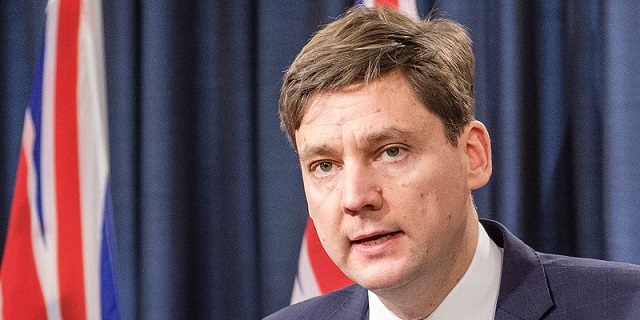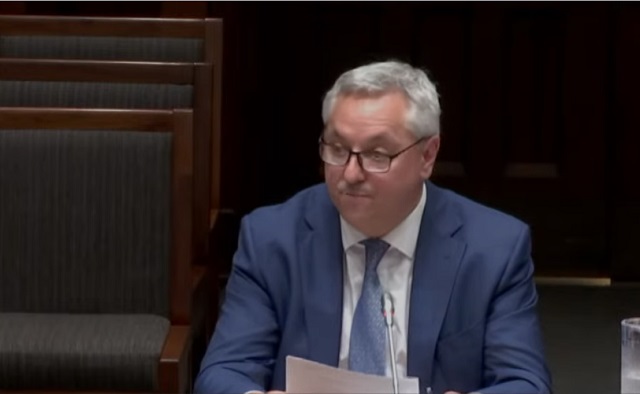Alberta
Alberta and B.C. budgets represent two different approaches to government finances

From the Fraser Institute
By Grady Munro and Tegan Hill
” for every $1 of additional revenue enjoyed by both provinces, the Eby government increased spending by more than $6 compared to 79 cents for the Smith government. “
In its recent budget, the Alberta government promised a new approach to provincial finances, with spending restraint and limited debt accumulation. While there’s still work to do, this is a far better approach than the reckless spending and massive debt accumulation of the British Columbia government.
The Smith government projects a $367 million surplus in 2024/25, followed by two more surpluses of $1.4 billion in 2025/26 and $2.6 billion in 2026/27. The government plans to use these surpluses largely to pay down debt, so although provincial net debt (financial assets minus liabilities) is expected to rise slightly in 2024/25 due to increased long-term capital spending (e.g. schools and highways), the debt is projected to decrease 4.1 per cent ($1.7 billion) from 2023/24 to 2026/27.
Alberta’s strong fiscal outlook is largely driven by historically high resource revenues. But while the government plans to increase program spending (total spending minus debt interest costs) nominally over the next three years, spending will grow at a slower rate than population growth and inflation—meaning spending will decline on an inflation-adjusted per-person basis.
The Smith government still must better align spending with stable revenues, but this is an important step in the right direction.
By contrast, B.C.’s 2024 budget projects a $7.9 billion deficit in 2024/25 followed by deficits of $7.8 billion in 2025/26 and $6.3 billion in 2026/27. These deficits, combined with borrowing for capital projects, will drive a projected $55.1 billion (74.7 per cent) increase in provincial net debt from 2023/24 to 2026/27. As a result, the level of net debt projected in 2026/27 ($128.8 billion) is nearly triple the level recorded in 2019/20 ($46.9 billion).
These deficits are due to a substantial increase in provincial spending by the Eby government. Indeed, similar to Alberta, B.C. has recently enjoyed an unexpected surge in revenues, but unlike the Smith government, the Eby government has shown no spending restraint.
From 2023/24 to 2025/26, revenues in B.C. will be a projected $2.0 billion higher than the government projected in last year’s budget, yet the plan for spending over that same period increased by $13.2 billion. For comparison, the Smith government also increased spending in these years relative to its 2023 budget, but did so by $2.1 billion less than the increase in revenues.
In other words, for every $1 of additional revenue enjoyed by both provinces, the Eby government increased spending by more than $6 compared to 79 cents for the Smith government.
The consequences of B.C.’s approach are clear. By spending far outside its means, the Eby government will saddle future generations of British Columbians with tens of billions more in debt that must be financed through taxes. For perspective, debt interest payments will nearly cost a projected $1,000 per British Columbian by 2026/27—that’s taxpayer money no longer available for programs or services. Moreover, continued deficits weaken the government’s ability to deal with future challenges (such as an economic downturn) without taking on more debt and driving up interest costs.
The Alberta and B.C. budgets provide examples of two different approaches to government finances. While there’s more to be done, Alberta is moving in the right direction to help prevent debt accumulation. On the other hand, B.C. is massively increasing spending and debt, to the detriment of British Columbians now and in the future.
Authors:
Alberta
Former senior financial advisor charged with embezzling millions from Red Deer area residents

News release from Alberta RCMP
Former senior financial advisor charged for misappropriating nearly $5 million from clients
On April 4, 2024, the RCMP’s Provincial Financial Crime Team charged a Calgary resident for fraud-related offences after embezzling millions of dollars from his clients while serving as a senior financial advisor.
Following a thorough investigation, the accused is alleged to have fraudulently withdrawn funds from client accounts and deposited them into bank accounts he personally controlled. A total of sixteen victims were identified in the Red Deer area and suffered a combined loss of nearly $5 million.
Marc St. Pierre, 52, a resident of Calgary, was arrested and charged with:
- Fraud over $5,000 contrary to section 380(1)(a) of the Criminal Code; and,
- Theft over $5,000 contrary to section 344(a) of the Criminal Code.
St. Pierre is scheduled to appear in Red Deer Provincial Court on May 14, 2024.
“The ability for financial advisors to leverage their position to conduct frauds and investment scams represents a significant risk to the integrity of Alberta’s financial institutions. The investigation serves as an important reminder for all banking clients to regularly check their accounts for any suspicious activity and to report it to their bank’s fraud prevention team.”
- Sgt. John Lamming, Provincial Financial Crime Team
The Provincial Financial Crime Team is a specialized unit that conducts investigations relating to multi-jurisdictional serious fraud, investments scams and corruption.
Alberta
Political parties will be part of municipal elections in Edmonton and Calgary pilot projects

Strengthening Alberta’s local elections
Alberta’s government is introducing legislation to ensure Albertans can rely on transparent, free and fair elections, and municipally-elected officials have clearer accountability measures.
In a democratic society, Albertans expect their local elections to be free and fair, and their elected officials to be held to account by clear rules that govern their local councils. The Municipal Affairs Statutes Amendment Act proposes amendments to the Local Authorities Election Act (LAEA) and the Municipal Government Act (MGA) to add greater transparency to local election processes and ensure local councils and elected officials continue to remain accountable to the citizens who elected them.
“Our government is committed to strengthening Albertans’ trust in their local governments and the democratic process that elects local leaders. The changes we are making increase transparency for Alberta voters and provide surety their votes will be counted accurately. We know how important local democracy is to Albertans, and we will work with local authorities to protect and enhance the integrity of local elections.”
Local Authorities Election Act
Albertans expect free and fair elections and that’s why it’s important we strengthen the rules that govern local elections. To strengthen public trust in local elections, Alberta’s government will eliminate the use of electronic tabulators and other automated voting machines. All Albertans should be able to trust the methods and results of local elections; requiring all ballots to be counted by hand, clarifying rules and streamlining processes for scrutineers will provide voters greater assurance in the integrity of the results.
All eligible Albertans should be able to vote in local elections without impediment. Alberta’s government will limit the barriers for eligible voters to cast a ballot by expanding the use of special ballots. Currently, special ballots can only be requested for very specific reasons, including physical disability, absence from the municipality, or for municipal election workers. By expanding the use of special ballots, the government is encouraging more voter participation.
Amendments in the Municipal Affairs Statutes Amendment Act would increase transparency in local elections by enabling political parties at the local level. Political parties would be enabled in a pilot project for Edmonton and Calgary. The act will not require candidates to join a political party in order to run for a local or municipal office, but will create the opportunity to do so.
In addition, proposed changes to the Local Authorities Election Act would allow municipalities the option to require criminal record checks for local candidates, thus increasing transparency and trust in candidates who may go on to become elected officials.
Municipal Government Act
The role of an elected official is one with tremendous responsibility and expectations. Changes proposed to the Municipal Government Act (MGA) will strengthen the accountability of locally elected officials and councils. These include requiring mandatory orientation training for councillors, allowing elected officials to recuse themselves for real or perceived conflicts of interest without third-party review and requiring a councillor’s seat to become vacant upon disqualification.
If passed, the Municipal Affairs Statutes Amendment Act will also unlock new tools to build affordable and attainable housing across Alberta. Proposed amendments under the MGA would also create more options for municipalities to accelerate housing developments in their communities. Options include:
- Exempting non-profit, subsidized affordable housing from both municipal and education property taxes;
- Requiring municipalities to offer digital participation for public hearings about planning and development, and restricting municipalities from holding extra public hearings that are not already required by legislation; and
- Enabling municipalities to offer multi-year residential property tax exemptions.
Municipal Affairs will engage municipalities and other partners over the coming months to hear perspectives and gather feedback to help develop regulations.
Quick facts
- The LAEA establishes the framework for the conduct of elections in Alberta municipalities, school divisions, irrigation districts and Metis Settlements.
- The MGA establishes the rules governing the conduct of local elected officials once on council, as well as the overall administration and operation of municipal authorities in Alberta, including any policy those authorities may wish to implement.
Related information
-

 Alberta2 days ago
Alberta2 days agoActivity-Based Hospital Funding in Alberta: Insights from Quebec and Australia
-

 Business2 days ago
Business2 days agoUN plastics plans are unscientific and unrealistic
-

 Business2 days ago
Business2 days agoTaxpayers criticize Trudeau and Ford for Honda deal
-

 Business2 days ago
Business2 days agoDon’t be fooled by high-speed rail
-

 Fraser Institute2 days ago
Fraser Institute2 days agoCanadians should decide what to do with their money—not politicians and bureaucrats
-

 Addictions2 days ago
Addictions2 days agoBritish Columbia should allow addicts to possess even more drugs, federal report suggests
-

 Censorship Industrial Complex1 day ago
Censorship Industrial Complex1 day agoJordan Peterson, Canadian lawyer warn of ‘totalitarian’ impact of Trudeau’s ‘Online Harms’ bill
-

 Alberta2 days ago
Alberta2 days agoAlberta rejects unconstitutional cap on plastic production








